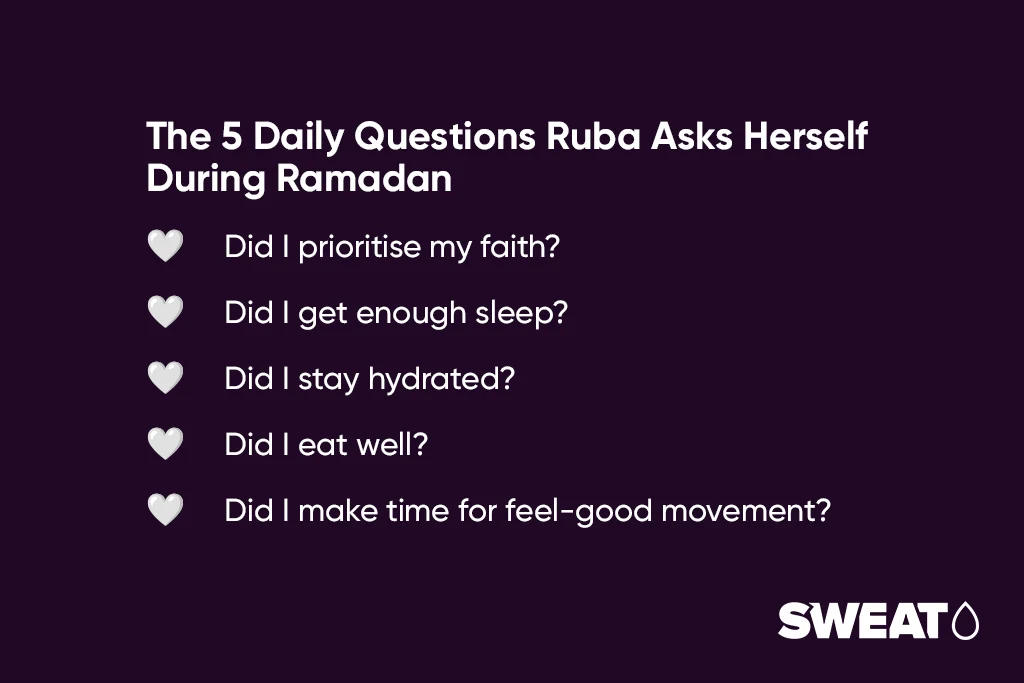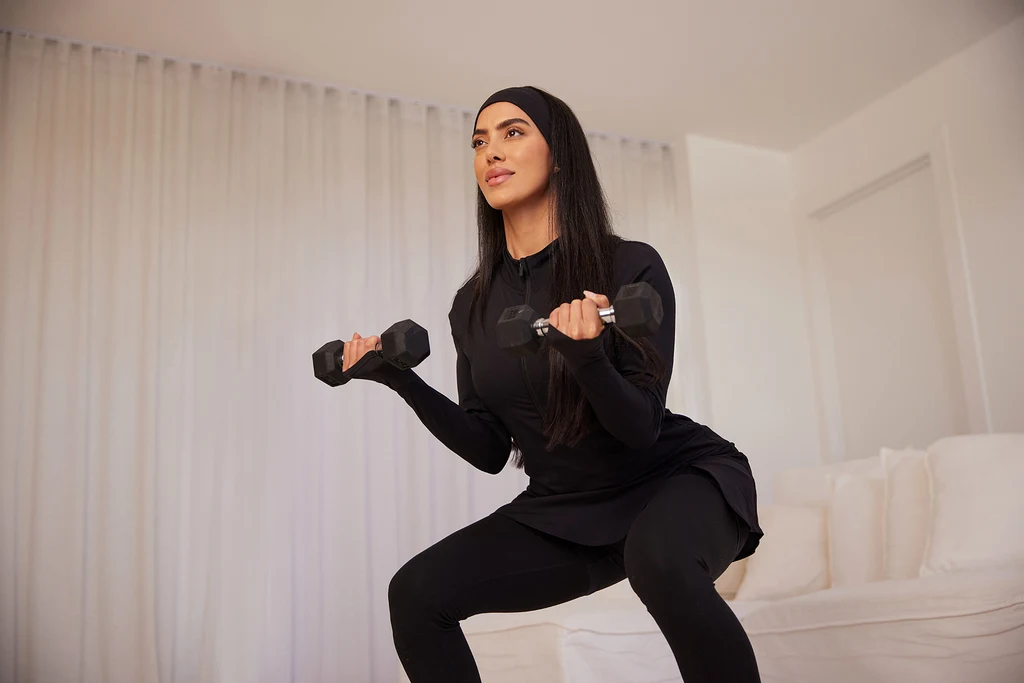How To Work Out Safely During Ramadan With The Sweat App
The Ramadan program you’ve been waiting for is coming to Sweat.

March 29, 2022 - Updated February 18, 2025

Ramadan Mubarak! To all our Muslim members of the Sweat Community, we wish you a blessed Ramadan.
For those participating in Ramadan (which begins next week), it’s common to wonder, should I keep working out while I’m fasting? How should I adjust my workout schedule? Which Sweat program should I follow? While it’s totally up to you, it is safe to keep exercising during this time (and we’ve got the perfect program for you to follow during Ramadan), but you might want to make some changes to how you work out to help you avoid fatigue and dehydration.
What is Ramadan?
Ramadan is a 30-day sacred period of reflection for Muslims, which involves fasting (meaning no food or drink, including water) from dawn to dusk each day throughout the Islamic holy month. Ramadan falls on the ninth month of the Islamic Lunar calendar and the exact timing is based on the sighting of the moon. This year it is expected to begin on the evening of 28 February or 1 March and run until to 30 or 31 March.
Each day after sunset, there is a meal shared with family or friends to break the fast called Iftar, and those participating in Ramadan usually also eat a big meal called Suhūr before the sun rises each morning. Fasting is not a requirement for children, the elderly or unwell, and pregnant or breastfeeding women.
While fasting is a big part of Ramadan, it’s also a period of self-reflection, spiritual connection, charity, prayer, good deeds and positive habits.
To end the month of fasting, there is a festival called Eid or Eid al-Fitr, to celebrate with friends, family and neighbours. For some, this celebration also involves things such as dressing up, giving gifts, praying in mosques or cooking special dishes.

Can you exercise during Ramadan?
It’s totally up to you, but if you feel up to it and would like to, you can still work out during Ramadan. Just keep in mind, it’s important to do it in a safe and sustainable way and know that this is not a time to push yourself. You should be prepared to make some adjustments to your usual routine or opt for a Ramadan-friendly workout program like Ruba Ali’s Ramadan Reset.
Ruba created this program to support any woman who wants to continue training during Ramadan as she knows just how important it is to reset your approach during this time.
“This month is focused on your spirituality and your connection with God. It’s a detox for your mind, body and soul,” she shares, explaining that the fasting requirements and a change in routine make changing your fitness approach more important than ever. “It’s not about hitting a PB, pushing yourself, losing weight or gaining weight. It’s about maintenance and momentum. Don’t set unrealistic goals, it’s never going to happen during Ramadan.”
Aside from the challenges of fasting, Ramadan can also make it hard to stick to your regular exercise routine due to the changes to your sleeping hours. We know how important it is to ensure you’re getting enough rest, so give yourself some flexibility if you need to prioritise sleep over your workouts. If you’re following Ramadan Reset, you’ll have three optional workouts each week to ensure rest is always something you’re prioritising.
Instead of focusing on smashing your fitness goals, hitting new personal bests or really challenging yourself in your workouts, reframe this month as a time to maintain your fitness, keep your body moving and stay nourished and hydrated as you focus on your faith.

What workout adjustments might be helpful?
If you’re keen to continue training during Ramadan, find a time that will work best for you by considering how long after a workout you prefer to eat, if you can exercise on an empty stomach, or how thirsty you get during or after a workout. This might be a period where you reduce your weekly workouts or exercise at a different time than you normally would! Especially in your first week of fasting, it can help to reduce the intensity or frequency of your workouts as your body adjusts.
During Ramadan, some people find it best to exercise just before Iftar (the breaking of the fast in the evening) or between Iftar and Suhūr (the pre-dawn meal), so you can replenish and rehydrate your body straight after completing your exercise session. These also tend to be cooler times of the day, so will reduce the amount of water lost through sweat. Others prefer to exercise after these meals in order to be properly fuelled and hydrated.
Whatever time works for you during Ramadan, be mindful of doing your workouts in hot temperatures, sweating too much or doing workouts that get you puffing, as these will all dehydrate you faster. Keeping any midday workouts light is always a safe bet.
Fasting can lead to changes in your energy levels, so Ramadan is a particularly important time to listen to your body. You can reduce the intensity of your sessions by focusing on things like strength training with reduced weights or gentle walks and stretching, rather than any high-intensity workouts or long cardio sessions.
Doing some strength training can also help to maintain muscle while fasting if you’re feeling up to it, but keep your focus on fitness maintenance as opposed to progression. You can dial your workouts up again next month!
If you’re not feeling your best, don’t hesitate to reduce the intensity, duration or frequency of your workouts, or take extra rest days. Our number one piece of advice? Always listen to your body. Likewise, you might want to tweak your workout goals in order to focus more on your faith or your time with friends and family.
Ramadan is Ruba’s favourite time of the year, and she always ensures her faith is her number one priority during this time. In some years she has chosen not to train at all during Ramadan, and she wants her community to know that’s also an option if that feels right for you.
“It’s such an amazing reset for your health, for your mind, for your body and your soul,” she says of Ramadan. “You feel like you have achieved the greatest thing after the 30 days. You’re so humbled, you’re so grateful and the world is just more colourful - it’s a really beautiful experience.”

Tips for nutrition and hydration
Being dehydrated can make it feel harder to work out and make you feel fatigued much faster. To stay hydrated, drink regularly between Iftar and Suhūr (breaking the fast and starting the next one), and remember that eating foods with a high water content can also go a long way in keeping you hydrated, as well as getting in lots of vitamins and minerals! Think fruit and vegetables such as apples, watermelon, celery, bell peppers, oranges and spinach.
If at any time you notice signs of dehydration such as dark urine, lightheadedness, headaches, nausea or muscle cramps, reduce your workout intensity or take a rest day, and focus on rehydrating when you can.
For your meals, it can help to eat foods that will keep you full for longer and will release energy slowly. To tick both of these boxes, try combining high-fibre starchy foods (such as brown rice, oats, potatoes, seeds, fruit and vegetables) for slow-releasing energy and digestion, with quality protein sources (such as eggs, fish, meat, tofu, beans or yoghurt) for fullness and satiation. Not everyone has the pre-dawn meal, but it is definitely encouraged for nutrient intake, sustained energy and reducing hunger.
Reducing your intake of caffeine and spicy or salty foods can also help to reduce thirst. If you are used to salty foods, different seasonings like herbs, spices and lemon juice can add delicious flavour!
30 days to reset, reflect, reconnect and refocus
Do you participate in Ramadan? Whether you’re following Ramadan Reset with Ruba Ali or choosing not to train, we would love to hear from you in the Sweat Forum if you have any tips of your own for staying healthy, active and feeling your best during this holy month.

A more empowered you starts with Sweat, and our editorial team is here to bring you the latest fitness tips, trainer recommendations, wellbeing news, nutritional advice, nourishing recipes and free workouts.
* Disclaimer: This blog post is not intended to replace the advice of a medical professional. The above information should not be used to diagnose, treat, or prevent any disease or medical condition. Please consult your doctor before making any changes to your diet, sleep methods, daily activity, or fitness routine. Sweat assumes no responsibility for any personal injury or damage sustained by any recommendations, opinions, or advice given in this article.
Fitness